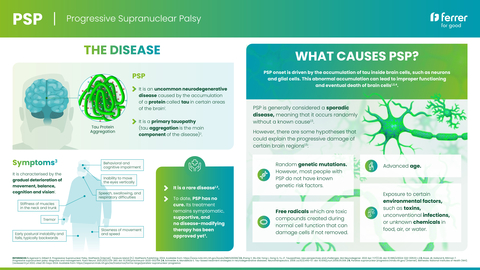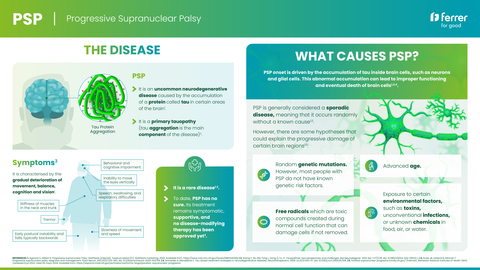BARCELONA, Spain--(BUSINESS WIRE)--Ferrer, a B Corp-certified international pharmaceutical company, has announced the dosing of the first participant in the Phase II clinical trial, PROSPER. The study seeks to evaluate the safety and efficacy of the molecule FNP-223,1 a novel therapy intended to slow the progression of Progressive Supranuclear Palsy (PSP).1,2
The PROSPER study is a randomised, double-blind, placebo-controlled Phase II clinical trial, consisting of a 52-week treatment period and a 4-week follow-up period.1 It is expected to include the participation of up to 220 participants and 46 clinical trial sites across the United States, the United Kingdom and 7 countries in the European Union. PROSPER is currently recruiting in the United States, with additional countries expected to begin recruitment in the fourth quarter of 2024.
“We are excited about the idea of being able to advance in this crucial phase of our research with FNP-223,” said Óscar Pérez, Chief Scientific Officer of Ferrer. “The inclusion of the first participant into the PROSPER clinical trial marks an important milestone in our commitment to find transformative solutions for people living with PSP.”
Progressive Supranuclear Palsy is a rare neurodegenerative disease that currently has no cure, although there are therapeutic options that can help alleviate its symptoms. The disease manifests in patients with difficulty speaking, imbalance, changes in gait, cognitive problems, difficulties with eye control, swallowing impairment, and other symptoms.3-5 PSP is a rare but devastating disease, with a yearly incidence of approximately 5 cases per 100,000 people. It mainly affects people over the age of 60 and is slightly more common among men4. Although its exact cause is unknown, the cause is thought to be related to the abnormal accumulation of tau protein in certain brain areas, which results in neurodegeneration and the disease’s characteristic symptom presentation.4,5 The average survival from onset is seven years.6
After having demonstrated in preclinical models that the administration of FNP-223 can prevent the abnormal accumulation of tau proteins in neurons,2 Ferrer now hopes to demonstrate that this molecule is also safe and efficient in patients with PSP. According to Pérez, “its effect on the tau protein could represent a therapeutic treatment capable of slowing down the development of this rare neurodegenerative disease.”
“At Ferrer we focus on improving the experience of people living with rare diseases and offering them equal opportunities, in line with our purpose of using business to fight for social justice,” said Jorge Cúneo, Chief Medical Officer of Ferrer. “For us, it is essential we hear first-hand the needs of patients and their caregivers. In this sense, CurePSP and PSPA UK, the main patient associations worldwide, have participated in the design of the PROSPER trial.”
According to Kristophe Diaz, Executive Director and Chief Science Officer of CurePSP, “our organization supports innovative research and clinical trials that offer hopes to people living with Progressive Supranuclear Palsy. The start of phase II for the PROSPER study represents a significant step in the search for treatments for this currently incurable disease, so we are delighted to collaborate with Ferrer and be able to contribute to this important milestone for our community".
References
- ClinicalTrials.gov A Randomized, Double-blind, Placebo-controlled, Phase 2 Study to Assess the Efficacy, Safety, and Pharmacokinetics of FNP-223 (Oral Formulation) to Slow the Disease Progression of Progressive Supranuclear Palsy (PSP) (PROSPER). ClinicalTrials.gov [Internet]. Disponible en: https://www.clinicaltrials.gov/study/NCT06355531. Consultado el 03/06/2024.
- Permanne B, Sand A, Ousson S, Nény M, Hantson J, Schubert R, et al. D. O-GlcNAcase Inhibitor ASN90 is a Multimodal Drug Candidate for Tau and α-Synuclein Proteinopathies. ACS Chem Neurosci. 2022 Apr 20;13(8):1296-1314. doi: 10.1021/acschemneuro.2c00057.
- Coughlin DG, Litvan I. Progressive supranuclear palsy: Advances in diagnosis and management. Parkinsonism Relat Disord. 2020 Apr;73:105-116. doi: 10.1016/j.parkreldis.2020.04.014. Epub 2020 May 25.
- Agarwal S, Gilbert R. Progressive Supranuclear Palsy. StatPearls [Internet]. Treasure Island (FL): StatPearls Publishing; 2024. Disponible en:https://www.ncbi.nlm.nih.gov/books/NBK526098/
- Rowe JB, Holland N, Rittman T. Progressive supranuclear palsy: diagnosis and management. Pract Neurol. 2021;21(5):376-383. doi: 10.1136/practneurol-2020-002794
- Lukic, M.J., Respondek, G., Kurz, C., Compta, Y., Gelpi, E., Ferguson, L.W., Rajput, A., Troakes, C., , van Swieten, J.C., Giese, A., Roeber, S., Herms, J., Arzberger, T. and Höglinger, G. (2022), Long-Duration Progressive Supranuclear Palsy: Clinical Course and Pathological Underpinnings. Ann Neurol, 92: 637-649. https://doi.org/10.1002/ana.26455




